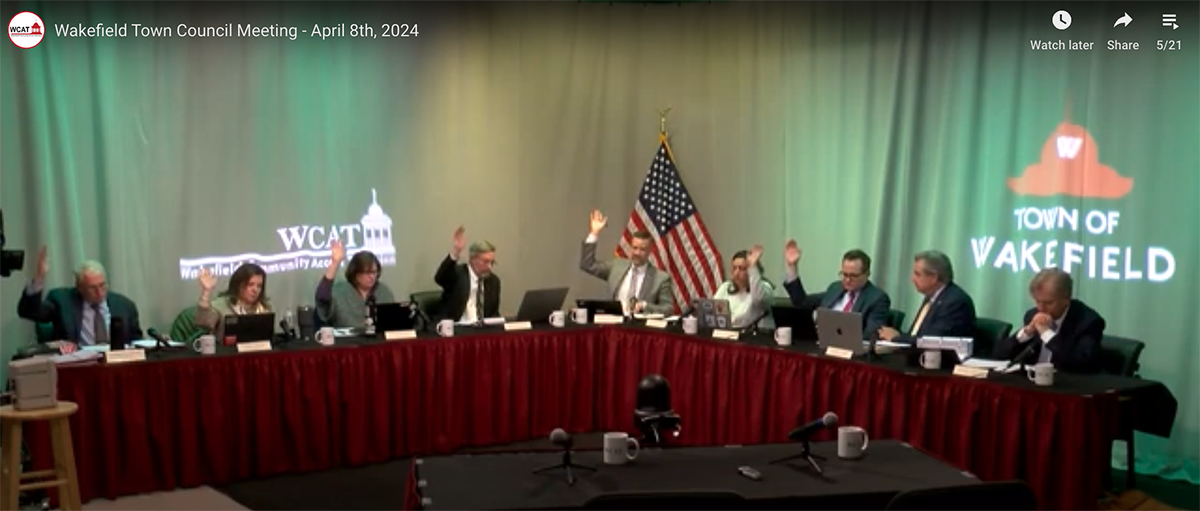By MARK SARDELLA
WAKEFIELD — According to Town Counsel Thomas Mullen, the Wakefield Town Council did not violate the Open Meeting Law at its April 8 meeting as alleged by Walden Road resident Scot McCauley. Mullen has investigated the complaint filed on May 3 and has responded in writing to McCauley and to the Massachusetts Attorney General, who oversees the Open Meeting Law.
McCauley’s complaint relates to an April 8 Town Council meeting where the board discussed and voted to approve a measure that was listed on the agenda simply as “Climate Leaders.” He alleges that the agenda item failed to provide “any type of content that would give the average person sufficient information as to what was to be talked about or voted on or to want to participate in discussion that evening.”
In his written response, Mullen acknowledges McCauley’s complaint.
“Mr. McCauley complains that the agenda for the Town Council meeting on April 8, 2024 was deficient for being insufficiently descriptive,” Mullen wrote. “The agenda item in question is ‘Climate Leaders,’ a reference to a state program providing funds for local decarbonization efforts.”
But Mullen maintains that the Town Council agenda, coupled with the supporting “meeting materials” posted on the town’s website, provided sufficient information to alert the public to the subject matter to be discussed at the April 8 meeting.
“Pursuant to 940 CMR 29.03, the Town has adopted its municipal website as its official means of posting notice of meetings,” Mullen wrote. “It is the practice of the Wakefield Town Council to post to its website not only meeting notices containing ‘a listing of topics that the chair reasonably anticipates will be discussed at the meeting,’ G.L. c. 30A, § 20(b), but also to couple each such agenda with a compilation of the materials sent to the Council members in connection with the meeting.”
Mullen goes on to note that, “The Town’s website shows that the agenda and materials for the meeting that which began at 6 p.m. on Monday, April 8, 2024, were uploaded on Wednesday, April 3 at 2:43 p.m., and were revised on Thursday, April 4 at 8:41 a.m. and Monday, April 8 at 6:42 a.m. The ‘Climate Leaders’ agenda item was at all times from Wednesday, April 3, 2024, included on the meeting notice that was posted to the website.”
Mullen notes that the meeting materials posted included a PowerPoint presentation describing the “Climate Leaders” program.
“From 8:41 a.m. on Thursday, April 4, 2024 to 6 p.m. on April 8, 2024, the Town’s website displayed both the ‘Climate Leaders’ agenda item and, together with it, a detailed PowerPoint presentation explaining the ‘Climate Leaders’ program.”
Mullen goes on to note that he conducted an internet search for the term “Climate Leaders” and easily found a description of the program on the state’s web site.
Mullen cites the standard that must be met for public meeting agenda items.
“Public bodies are required to list topics in a meeting notice with ‘sufficient specificity to reasonably advise the public of the issues to be discussed at the meeting.’ 940 CMR 29.03(1)(b). We generally consider a topic to include sufficient specificity when a reasonable member of the public could read the topic and understand the anticipated nature of the public body’s discussion.”
Mullen acknowledges that he could find no previous decisions in which associated “meeting materials” could be taken into account when assessing whether an agenda item was sufficiently specific.
“I suspect that is because the Wakefield Town Council is a true outlier in this respect, providing, through its posting of such materials alongside the agenda, tremendously more information about upcoming meetings than most communities attempt or than the law demands,” Mullen wrote. “I submit that the term ‘Climate Leaders,’ taken together with the detailed supporting information posted together with the agenda and the ready availability of further such information online, more than sufficed to alert members of the public to the fact that the Town Council anticipated discussing the Town’s possible participation in the ‘Climate Leaders’ program.”
Mullen acknowledges the fact that McCauley also complained that the vote taken by the Council to apply for the Climate Leaders grant constituted a significant commitment on the part of the Town that was disproportionate to the degree of notice afforded by the single agenda item at issue.
In his response, Mullen notes that, “The law does not require a public body to anticipate the course of deliberation or the outcome of a discussion, only that it identify the discussion topic with sufficient specificity to reasonably advise the public of the issues to be discussed at the meeting. By identifying the specific grant program to be discussed, the agenda (together with the detailed meeting materials that were posted with it) accomplished the purpose of G.L. c. 30A, § 20(b). There was no obligation on the part of the Town Council Chair, in constructing the agenda, to predict where the discussion of that topic may lead.”
Mullen determined that no violation of the Open Meeting Law took place.
“For the reasons set forth above, I submit that the Town did not violate the Open Meeting Law as alleged in Mr. McCauley’s complaint,” Mullen concluded.

The April 8, 2024 meeting of the Wakefield Town Council. According to Town Counsel Thomas Mullen, the Wakefield Town Council did not violate the Open Meeting Law meeting as alleged by Walden Road resident Scot McCauley.




